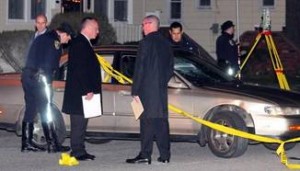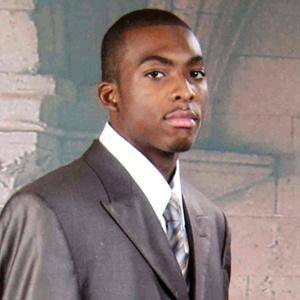HIM 26 AND SHE 21?
Wayne Carrington
The Honda Accord used in deadly chase.
A jealous Queens woman got behind the wheel of her car and allegedly made her boyfriend run for his life before fatally running him down, law-enforcement sources said yesterday.
Kaman Drummond, 26, was frantically ducking and weaving through parked vehicles as Hofstra University dropout Dunasha Payne, 21, sped after him in her 1994 Honda Accord just before midnight Monday night, the sources said.
Residents heard his pleas for help and called 911.
The first caller said Drummond was being chased by a vehicle speeding northbound on 208th Street in Queens Village.
Other callers said Drummond was trying to flee at Hollis Avenue and 208th Street.
When cops arrived at about 11:50 p.m. Monday, they found Drummond, his head and body crushed, in front of 104-37 208th St.
He was taken to Queens General Hospital, where he was declared dead at about 12:30 a.m. yesterday, sources said.
Payne, of Cambria Heights, was arrested and charged with murder and criminal possession of a weapon.
She told cops she became enraged during a fight with Drummond over another woman, although it was unclear if the love rival was a simultaneous or ex-girlfriend.
Drummond stormed out of the house, and Payne got into her car.
She insisted to cops that she never wanted to kill him, only frighten him.
She also said she was speeding to try to catch him, but he kept ducking between cars, the sources said.
Payne still lists herself as a Hofstra University student on her Facebook page, but actually dropped out in the fall of 2010, the school’s records show.
She also noted on Facebook that on March 18, she took a test to become a postal worker. One photo on her page is a close-up of her car keys.
Yesterday afternoon, her Facebook page was taken down.
Police sources said that there were no domestic-incident reports on the couple.
But Drummond’s next-door neighbor said the two were “fighting all the time.” He also described Drummond as “a really good guy.”
A tearful Payne bellowed uncontrollably in court yesterday as her lawyer described her allegedly abusive relationship with her boyfriend. She is being held in lieu of $250,000 bail.
“She was verbally and physically abused for years,” her friend said outside of court.
Payne has an arrest record in Virginia. The victim had arrests for dealing cocaine and turnstile jumping.
At Drummond’s home yesterday, his sister burst into tears when she identified the suspect on her Facebook page.
[email protected]
WTF AFRICA- CHEATERS CAUGHT DOING IT , STRIPPED..
Two Livingstone Lovers Attacked, Stripped And Left Naked
Two Livingstone lovers have been attacked and stripped naked after they were found having a good time in a car.
Southern province police commissioner Charity Katanga yesterday disclosed in an interview that the thugs armed with machetes and sticks attacked Santus Kandangwe aged 35, a business man and his girlfriend Vanessa Kabanga aged 48, a manager at Livingstone Hostels Board on Saturday night at around 19 30 hours.
She said the duo was attacked after they parked their car a few kilometers from Livingstone weighbridge along Livingstone-Lusaka road. Katanga said Kandangwe who is married, informed the police that the thugs attacked him and his girlfriend and got away with clothes, leaving them naked.
She said the thugs also got away with KR3, 200 and other valuables. Katanga disclosed that Kandangwe sustained an injury on the left leg following the attacked.
The lovers claimed they were attacked after they stopped and parked the car along the road to allow the woman to answer the call of nature.
Katanga said good Samaritans that found the couple stranded on the road naked however assisted them with clothes before they reported the matter to the Livingstone Central police Station
She said Kandangwe stopped attempts by the police to call the wife and ask her to bring him descent clothing
MAKING THE DEAD ALIVE- GOODMORNING
Making the Dead Alive
Translating Sheol as Hades Brings the Dead to Life
The Bible teaches that when a person dies he is dead in every way. His body is dead, and his soul and spirit die also. He is not alive in any form, in heaven or elsewhere. The human body cannot live without a soul, and the soul and spirit cannot live apart from a body. A “person” is an integrated whole. God has designed us so that our parts work in a totally integrated way, and not by themselves. This is one reason why the majority of the uses of “soul” in the Bible do not mean “soul” in the sense of the life force of the body, but rather the entire person. Thus, when Acts 2:43 (KJV) says that “…fear came upon every soul…,” it means fear came upon every person. Once a person dies, he remains dead until he is raised from the dead by the Lord.
It is not our purpose in this short article to go over the clear verses that show that a dead person is dead in every way, or to explain the difficult verses on the subject of what happens when we die, because we do that in our book, Is There Death After Life and our free online seminar, Death & Resurrection to Life. Rather, we will focus on understanding a major reason why there was so much confusion at the time of Christ about what happened to people when they died. This confusion shows up vividly in the division between the Pharisees and the Sadducees. The Pharisees asserted that after death the soul lived apart from the body and went to a place of either torture or bliss, while the Sadducees thought that death was the end of life totally, and even denied the resurrection.
In order to understand the confusion existing at the time of Christ concerning the state of the dead, we must understand what the Greeks believed about what happened when people died. An important part of the Greek religion and philosophy was the belief that each person has a soul that is immortal. In fact, the modern Christian concept of the “immortal soul” does not come from the Bible, but from Greek philosophy.
We must be careful when we generalize about what the Greeks believed, because they were like modern Christians—there is much we agree about, but there are also very distinct differences in what we believe. In general, Greeks believed the soul was immortal, and some believed that humans, animals, and even plants have an immortal soul. To give us an idea of some of the different beliefs about the soul, let us look at four that were held among the Greeks.
Some believed that once a person died his soul went to “Hades,” the Underworld, for a period of purification, then entered a new body, a cycle that was repeated for eons until that soul was in a completely virtuous person, at which point the transmigration ended and the soul could enter a blessed place, sometimes known as the Blest Isles or Elysian Fields. (It is important that we realize that for most Greeks, Hades was not a place of torture, but a gloomy place where the immortal souls of the dead dwelled).
Some believed that when a person died his soul went to Hades and faced judgment. If it was found guilty it was punished, which lasted, like the soul itself, forever (this belief most naturally lent itself to the development of the orthodox Christian doctrine of burning in “hell” forever). If the soul was not found guilty, it might wander in Hades, the Underworld, also called the Land of Shades, or it might return in another person.
Some believed that if the dead body was not taken care of properly when the person died, the immortal soul would wander the earth, possibly even as a ghost, revenging itself upon mankind.
Some believed what Homer wrote, that the soul of an especially heinous person suffered punishment in Hades, while the souls of the rest of humanity simply suffered the gloomy fate of wandering endlessly in the dark underworld. [1]
In Greek mythology, Hades was the god of the Underworld, who oversaw the souls of the dead that resided there. Eventually, the name of the god Hades was given to the Underworld itself, so that it was then also called Hades. Greek writers wrote about the Underworld, Hades, but most of the writing was not meant to be a doctrinal presentation. Rather, it was stories and legends of gods and heroes who went there for various reasons, and there are many differences in their stories about what Hades is like. There is, however, one very important similarity: the disembodied souls there were all alive. No immortal soul in Hades was dead. In fact, because the standard Greek belief was that the soul was immortal, no one in Greek mythology ever died. Bodies died, but the “person” lived on in the form of a disembodied soul.
Knowing what the Greeks believed about life after death is very important, because, in 332 BC Alexander the Great conquered Israel, and for more than 150 years the Greeks controlled Jerusalem and Israel. Through the years, Greek thought and religion deeply influenced Jewish culture. By 250 BC there were so many Jews who spoke Greek and not Hebrew that the Old Testament was translated into Greek, in a version we now call the Septuagint. The Greek vocabulary in the Septuagint drove Greek thought even more deeply into the Jewish culture.
One area of Jewish thought and culture that was greatly influenced by the Greeks was the state of the dead. The Hebrew Bible made it clear that the dead were dead in every way. That was the reason the Sadducees believed that when a person died he or she was dead in every sense of the word, and not alive in any form. The real problem with their belief was that it did not take into account the Old Testament teachings of the resurrection from the dead. [2] Thus, the Sadducees had a dismal and gloomy belief system that had no future joyous hope, but they were right about what happened to people when they died—they are not alive in any form.
Alice Turner writes in her book, The History of Hell,
The Jews, judged solely by the evidence of the Old Testament, were either the least morbid or the least imaginative of the Mediterranean peoples. Unlike their neighbors, they had no relationship with the dead; they did not worship them, sacrifice to them, visit them, hope to reunite with them in the afterlife, nor anticipate any kind of interaction with Yahweh after death….” [3]
Turner’s observations are right on target. The Old Testament teaches that the dead are dead, so there was no reason to worship them or sacrifice to them, nor was there any thought of uniting with them “in the afterlife.” In fact, God strictly forbids trying to contact the dead, because that only opens the door for demons to impersonate the dead and cause harm (Deut. 18:11). The Sadducees recognized that the major difference between what they taught and what Jesus taught concerned the resurrection from the dead, so they tried to poke holes in his belief about the resurrection. They asked him, if a woman had seven husbands, whose wife she would be in the resurrection. Jesus did not state or imply that the woman or her dead husbands were alive in any way, but rather said that “in the resurrection” there is no marriage (Matt. 22:23-32).
The Hebrew text of the Old Testament tells us that when a person dies he goes to “Sheol.” Sheol is not “a grave,” i.e., a physical place where the body is laid. A physical grave is qeber in Hebrew. Neither is Sheol the same as “dead” (Hebrew: muth), which is the absence of life. Neither Greek nor English have an equivalent word to Sheol. It refers not to the place where the dead are buried (a grave), but to the state of being dead. We might refer to it as “gravedom” (the realm and dominion of the grave), or “the” grave, versus “a” grave.
That the Hebrew language has a specific word for the state of being dead or the dominion of death is very important, because it recognizes the existence of the person while affirming that he is dead. We really cannot do that in English. If we say in English, “John is dead,” that is a fact, but it can also mean that John will never exist in the future. Thus, an atheist might say that John is dead, and believe that when John died his existence ended as well. However, if a person is in Sheol, he is dead and not alive in any form, but “he” still exists, which is why “he” can be raised from the dead.
E. W. Bullinger wrote about Sheol:
The student will find that “THE grave,” taken literally as well as figuratively, will meet all the requirements of the Hebrew Sheol: not that Sheol means so much specifically a grave, as generically THE grave. Holy Scripture is all sufficient to explain the word Sheol to us. If we inquire of it in the above list of occurrences of the word Sheol, it will teach (a) That as to direction, it is down. (b) That as to place, it is in the earth. (c) That as to nature, it is put for the state of death. Not the act of dying, for which we have no English word, but the state or duration of death…. Sheol therefore means the state of death; or the state of the dead, of which the grave is a tangible evidence. It has to do only with the dead. It may sometimes be personified and represented as speaking, as other inanimate things are. It may be represented by a coined word, Grave-dom, as meaning the dominion or power of the grave. (d) As to relation, it stands in contrast with the state of the living (Deut. 30:15 and 19; 1 Sam. 2:6-8). It is never once connected with living, except by contrast. …(f) And, finally, as to duration, the dominion of Sheol or the grave will continue until, and end only with, resurrection, which is the only exit from it (see Hosea 13:14; etc. and compare Ps. 16:10 with Acts 2:27 and 31, 13:35). [4]
Scripture is very clear that when a person dies and goes to Sheol his activity ceases:
Ecclesiastes 9:10 (ESV)
Whatever your hand finds to do, do it with your might, for there is no work or thought or knowledge or wisdom in Sheol, to which you are going.
There is no knowledge or thinking in Sheol, so there certainly is no rejoicing. This verse is not speaking only of a person’s body, as if the body went to Sheol but the soul was either in heaven with God or suffering in Hell. It is the “person,” including his soul, who goes to Sheol when he dies.
Psalm 89:48 (ESV) [5]
What man can live and never see death? Who can deliver his soul from the power of Sheol? Selah
Many of us have so much trouble in life that sometimes we just wish it were over, that we could rest in the sleep of death and be awakened by Jesus at the Rapture. Job was no different. He had so much trouble that he thought about resting in death until the resurrection.
Job 14:10-14
(10) But man dies and is laid low; he breathes his last and is no more.
(11) As water disappears from the sea or a riverbed becomes parched and dry,
(12) so man lies down and does not rise; till the heavens are no more, men will not awake or be roused from their sleep.
(13) If only you would hide me in the grave [Sheol] and conceal me till your anger has passed! If only you would set me a time and then remember me!
(14) If a man dies, will he live again? All the days of my hard service I will wait for my renewal to come.
There is tremendous truth in the above verses. When people die, they are asleep in death, not alive with God. Job was in such misery that he longed for rest, to be hidden in Sheol. He certainly did not want to be in a place where his soul wandered in the dark and gloom, without knowledge of God. Who would wish for that? On the other hand, if Job believed that when he died his soul or spirit went to heaven or a wonderful place, he would not have spoken of sleeping in death and waiting for his renewal to come. There is no life in Sheol; people sleep in death and await the resurrection, and that is what Job wanted—to rest from his misery. We must pay attention to the fact that if Job thought his soul or spirit would live in a blessed place after he died, he would not have said what he did.
Great confusion about the state of the dead was introduced into Old Testament theology and Jewish thinking when the Septuagint, the Greek Old Testament, was translated for Greek-speaking Jews, because the Hebrew word “Sheol” was translated into the Greek word “Hades.” In Sheol everyone was dead, but in Hades everyone was alive. Thus, by the stroke of a translator’s pen, the dead were made alive.
We do not know why the translators used Hades in the Septuagint. Perhaps after some 75 years of Greek dominance they had been so influenced by Greek thought that they believed the dead were alive, and thought they were only clarifying the situation for the Greek-speaking Jews. Perhaps they felt “Hades” was the best word they could choose, because the Greek language did not have a word equivalent to “Sheol.” We do not know the reason, but we know the result: the Bible of every Greek-speaking Jew suddenly read that after a person died his soul stayed alive and went to the Underworld. No wonder that by the time of Christ there was confusion about the state of the dead. No wonder Jesus spent the opening part of his first public sermon, the Sermon on the Mount, speaking about the future hope of the people of God. [6]
What the Jews believed at the time of Christ was very important, because as the first-century Church developed, the Christians were converts from two main groups, Jews and Greeks. The Greeks believed in an immortal soul, and that everyone was alive after they died. Many of the Jews, especially those who read the Septuagint, believed the same thing. Therefore it is not hard to see how the modern orthodox belief of an immortal soul living on after the body dies came into Christianity.
Interestingly, we have had the same problem in English as the Jews had 250 years before Christ. Just as there was no Greek equivalent to the Hebrew word “Sheol,” so there is no English equivalent. Thus “Sheol” is sometimes translated “hell” in the King James Version, which is read by many Protestants, and also sometimes translated “hell” in the Douay-Rheims Bible read by many Roman Catholics (cp. Deut. 32:22; Job 26:6; Ps. 9:17; Prov. 5:5, 9:18, 15:11; Isa. 28:15; in both versions). When the average Christian reads those versions, he does not see that the dead are dead and in Sheol, what he learns is that what he was taught in church is “confirmed” in the Bible: that “Hell” is a place where the souls of the wicked dead go.
It is a sad fact for readers of the English Bible that the English versions that use “Hell” to translate “Sheol” are actually more confusing than the Septuagint. That is because the Septuagint uses “Hades” as the translation of “Sheol” every time, so someone reading the Septuagint and thinking seriously about what it said would see some contradictions and start to ask questions. In contrast, the King James Version, for example, sometimes translates “Sheol” as “hell,” sometimes as the “grave,” and sometimes as “pit,” depending on the context, so the English reader would never know to ask the right questions that would lead to the conclusion that the dead are not alive after all.
Thankfully, some modern versions, like the ESV, recognize that there is no English equivalent to Sheol, and thus are simply transliterating Sheol when it appears, forcing the English reader to get to know what “Sheol” means. Of course, people who already believe that Sheol is a place where one’s soul goes to live when his body dies will still be confused. But those students who take the time to look up all the uses of Sheol and see how it is used in the Bible will realize that it is the dominion of death, the place we, including our souls, all go if we die. Although there is no consciousness for the dead, the Lord Jesus remembers those who are part of his Body, and he will one day raise them out of Sheol, out of the state of death, back to life, a life much more vibrant and joyful than the one we have now.
BOSTON BOMBER IDENTIFIED
Investigators believe they have identified a suspect in the Boston Marathon bombing from security video and an official statement was expected later in the day, a law enforcement source said on Wednesday.
However, no arrest had been made, three separate government and law enforcement sources told Reuters.
Police may make an appeal to the public for more information at a news conference scheduled for later on Wednesday, a government source said.
RELATED
Photos: Boston Marathon explosions
Photos: Boston Marathon bombing evidence
Ind. woman hurt in marathon blasts: ‘Blood and glass everywhere’
Videos: Explosions at marathon
To find bomber, reconstruct the bombs
See more stories »
Ads by Google
Earlier, CNN reported that a suspect was in custody, citing law enforcement sources. But then the network cited three sources who said no one was under arrest after all.
The identification of a possible suspect marked the most significant publicly disclosed break since Monday’s blast at the marathon finish line killed three people and injured 176 others.
Investigators were also searching through thousands of pieces of evidence from cell phone pictures to shrapnel shards pulled from victims’ legs.
Based on shards of metal, fabric, wires and a battery recovered at the scene, the focus turned to whoever may have made bombs in pressure cooker pots and taken them in heavy black nylon bags to the finish line of the world-famous race watched by crowds of spectators.
A stretch of Boston’s Boylston Street almost a mile long and blocks around it remained closed as investigators searched for clues in the worst attack on U.S. soil since the hijacked plane strikes of September 11, 2001.
Cities across the United States were on edge after Monday’s blasts in Boston. Adding to the nervousness was the announcement that mail containing a suspicious substance addressed to a lawmaker and to President Barack Obama. The FBI said, however, that agents had found no link the attack in Boston.
The blasts at the finish line of Monday’s race injured 176 people and killed three: an 8-year old boy, Martin Richard, a 29-year-old woman, Krystle Campbell and a Boston University graduate student who was a Chinese citizen.
Boston University identified the student as Lu Lingzi.
No one has claimed responsibility for the attack.
“Whether it’s homegrown, or foreign, we just don’t know yet. And so I’m not going to contribute to any speculation on that,” said U.S. Secretary of State John Kerry, who until January was Massachusetts’ senior senator. “It’s just hard to believe that a Patriots’ Day holiday, which is normally such time of festivities, turned into bloody mayhem.”
IT IS COMING OUTTT
Glenroy Sinclair, News Coordinator
A prominent political activist is among five persons taken into custody, in connection with, the robbery of the Swiss Stores in downtown Kingston last week.
The five were arrested by members of the police Flying Squad working with other elite police units.
During a two-day operation in St Thomas, St Catherine and the Corporate Area the police recovered 16 of the 23 watches which were stolen.
The other seven watches had been already recovered by the investigators.
The police also seized US$150,000; J$500,000; two licensed shot guns; one illegal firearm; and a quantity of ammunition.
****RULES**** 1. Debates and rebuttals are allowed but disrespectful curse-outs will prompt immediate BAN 2. Children are never to be discussed in a negative way 3. Personal information eg. workplace, status, home address are never to be posted in comments. 4. All are welcome but please exercise discretion when posting your comments , do not say anything about someone you wouldnt like to be said about you. 5. Do not deliberately LIE on someone here or send in any information based on your own personal vendetta. 6. If your picture was taken from a prio site eg. fimiyaad etc and posted on JMG, you cannot request its removal. 7. If you dont like this forum, please do not whine and wear us out, do yourself the favor of closing the screen- Thanks! . To send in a story send your email to :- [email protected]









Recent Comments